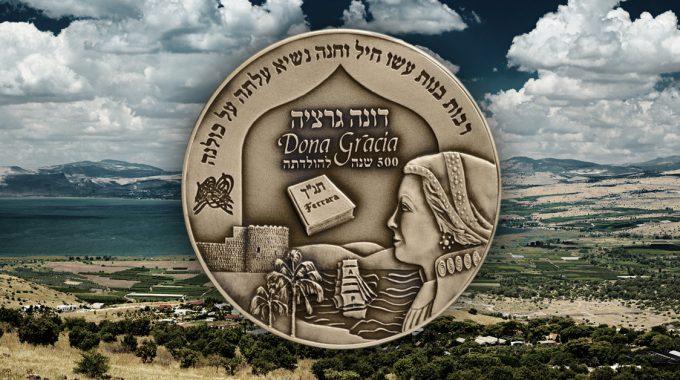Candace Owens’ Personal Attacks Have Only Strengthened My Resolve to Stand With Israel By Laurie…

A Jewish Heroine From The Inquisition – We Must Not Forget!
With our research for the ambitious new PJTN documentary, “The Lost Jews of the Inquisition” well underway, I uncovered a remarkable story which deserves to be re- told to a new generation of Jews, to those who love Israel, and indeed the world.
Dona Gracia Nasi was recognized in the 1500’s as a great Jewish heroine. For decades she ran an elaborate “underground railroad” transporting Jews fleeing the Inquisition. Single handedly she supported Jewish communities in Italy, Turkey, and what was then called Palestine. Praised in her lifetime as “the heart of her people,” sadly, this remarkable woman is all but forgotten in our 21st century world. Her story by itself is compelling reason enough why the brave history of ‘The Lost Jews of the Inquisition” must be told.
She was born Beatrice de Luna into a secret Jewish family in Portugal in 1510 and given the name “Gracia Nasi” as her Jewish family name. Her family, who had fled the Spanish Inquisition of 1492, were merchants of affluent means, who decided to stay in Portugal while thousands were expelled. They became “Conversos” or supposed converts to Christianity while maintaining their Judaism in secret.
At the age of 18, she married Francisco Mendes, another secret Jew and together they would build a large trading company. After only 8 years of marriage, Francisco died in 1536, the same year the Portuguese authorities began to crack down harshly on the secret Jews—setting up a “Holy Office of the Inquisition” modelled after Spain’s fearsome religious police. Gracia Nasi and her young daughter were among the Jews who fled, settling in Antwerp. Her trading company grew there under her direction to become one of the most successful of its time.
Though she couldn’t live openly as a Jew herself, she began to increasingly use her growing international business contacts to help other Jews escape to cities where they could live openly. She helped scores of secret Jews of Spain and Portugal escape the ravages of the Inquisition and make the difficult journey over the Alps into Italy and the Balkans. Her business hid an elaborate network of escape routes throughout Europe. While she exported ships laden down with spices, gems and other riches of the day, secret Jews were smuggled across borders along with the merchandise. Through her network, aid was given to Jewish refugees to help recover property which they had been forced to leave behind. Those fleeing were often given employment in Gracia’s warehouses and businesses in the Netherlands until they could be dispatched to safety further south in Turkey and Italy. Instructions were given to those on the run about which roads to use, which inns were safe, and which allies were sympatric to Jews along the routes.
Writing in 1946, the British historian, Cecil Roth* noted that Dona Gracia Nasi was single-handedly the mastermind behind the whole of an elaborate underground organization. “There is nothing similar in Jewish history, or perhaps any history, until our own day,” he noted. “The organization of an ‘underground railroad’ for saving Jews during the Inquisition pre-dated by almost four hundred years the Holocaust, the escape from the hell of Nazi and post Nazi Europe and securing for the Jews their entry to the Land of Israel.”
Of her generosity it was written, ”Each day, poor people entered her grand home to receive free meals. Gracia paid to redeem Jewish slaves who were seized by pirates. When Turkey experienced a bitterly cold winter, she paid to help the empire’s poor Jews afford heat and clothing. She supported hospitals, charities, schools and synagogues throughout the Ottoman Empire.”
Perhaps her most ambitious project was supporting the Jewish community in Eretz-Israel, what was then called Palestine. She petitioned the Sultan for permission to resettle Spanish Jews in Tiberias, the ancient city in northern Eretz-Israel. And when he agreed, she helped build a thriving Jewish settlement there in the Region. Amidst her philanthropy, Garcia had a promise to keep. Years before, she had promised her husband, Francisco that she would do everything in her power to have his body moved from Lisbon and brought to Eretz-Israel, to rest at Tiberias. Sadly, she never had the chance to follow him there. She grew ill and lived out her later life in Constantinople. Upon her death in 1569, she was honored as one of the most beloved figures in the entire Jewish world.
Tributes were delivered to her throughout Europe and the Middle East. Her passing was described in that time as one of the major calamities in Jewish history. Jewish poet Sa’adiah Longo, who had fled the Spanish Inquisition with his family while still a child, witnessed first-hand the generosity and help given the Jewish community by the woman known as “the heart of the people.” “She straightened the path in the wilderness… the passage to an awesome God.“ he wrote.
That passageway allowed thousands of Jews to escape persecution and death at the hands of the Inquisition and build new lives in new worlds.
May her heroism and her contributions to Judaism never be forgotten!

President/Proclaiming Justice to The Nations
*Cecil Roth, “The Spanish Inquisition” published by W.W. Norton (1936)



